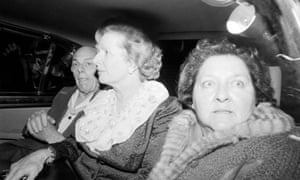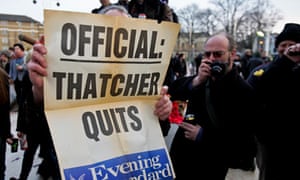 |
| A young Damian Barr on a swing. Photograph by Damian Barr |
Growing up in Glasgow under Margaret Thatcher: 'She was there for me'
Everyone on the street where Damian Barr grew up in the shadow of Glasgow's Ravenscraig steelworks loathed Thatcher. Well, nearly everyone …
Damian Barr
Monday 15 April 2013 07.00 BST
I
cried when I heard you were dead. Just as I cried in the classroom on Wednesday 28 November 1990 when you were ousted from Downing Street. The door of our modern-studies class burst open and Mr Roebuck wheeled the TV in like a doctor rushing a patient into theatre. As it clunked into life he shouted – actually shouted – "She's gone, she's gone!" There you were, eyes brimming with tears – actual tears – in the back of a Jaguar, ever-faithful Denis by your side, his thick black specs fixed on an uncertain future.
Then, as now, somebody sang Ding Dong! The Witch Is Dead. Then, as now, tears scalded my cheeks, evaporating instantly, boiled off by confusion. I had every reason to celebrate you passing from Downing Street to stucco obscurity in Belgravia, every reason to cheer your journey from this life to wherever you end up next. You closed the Ravenscraig steelworks where my dad and thousands of other dads worked, you privatised our fractured family into poverty and you didn't seem to care about any of it. You were the blonde bombshell that went off at the heart of my community, my country. And yet I will join the crowds lining the street for your funeral. You inspired me and oppressed me. I will pay you the respect that you never showed me. I'll show you right up, as my granny would say – she didn't die in the Ritz.
Late last Monday morning, my phone bleeped a morbid morse code as tweets and texts surged in. "Thatcher dead!", "She's gone!" and "Talk about timing!" because my memoir was about to be published. Maggie & Me is my story of surviving the decade that Thatcher defined. It's my life and my life's work. It has already been rushed out in America and Canada and soon will be here. That's market forces in action. Profit in loss. It's what she would have wanted, isn't it?
Death brought me even closer to Maggie but she was always with me, part of my family, hovering darkly on the edge of every Polaroid. "Divisive" is the euphemism everybody reaches for now. She divided, yes, but only as a scalpel parts flesh. Some cuts need to be made, however painful.
Detested and despised, that's what she was in my house. On my street. In my village – built over the coal mines where James Keir Hardie, co-founder of the Labour party, toiled. Maggie was a swearword. She was our bogeyman. Every teacher at Keir Hardie memorial primary school hated her and taught me to hate her, too; more successfully than they did decimals. When we had to rub out the scribblings in our jotters because there were no new ones we were told to blame Maggie. I blew away the grey rubbings out and worried the lessons might disappear from my brain as easily as they had from the page. School milk lingered longer in Scotland but Maggie threatened to snatch the cartons from our hands. Despite all this, my heart leapt when I saw her on the telly.
My strongest Maggie memory dates from 13 October 1984 – the day my mum left my dad and the IRA bombed the Grand Hotel. I was just eight years old. Me and my mum were stuck to the BBC Nine O'Clock News. We sat crosslegged on bare floorboards with coats for cushions in a strange new flat and watched in black and white on the portable telly, which was balanced on top of a tea chest. My wee sister cried herself to sleep in my mum's lap. Our old life was crammed in the cardboard boxes bursting all around us. Way past bed time but rules were already being broken.
My mum lifted an arm and I snuggled in. She lit a Regal cigarette and shook her head at the telly, tutting and pulling me closer. Blue smoke cloaked us. "Luck o' the devil," she huffed, puffing away at the telly where this blonde woman rose from rubble again and again like a Cyberman. All was chaos but she stayed calm. She talked to the BBC with a man's voice. "Life must go on as usual," she insisted, as if life would do exactly what she told it.
"Shit disnae burn, Maggie won't," said my mum, smoking furiously. Hours passed and the news stayed the same: Maggie was still not dead. My mum couldn't believe it. She hated Maggie and said Maggie hated Scotland, hated us. But all the people on the BBC seemed glad she had made it. Secretly, I was too. I didn't want to see her dead, maybe just because everybody else did. She hadn't done anything to me. I wanted to brush the dust from her big blond hair, like she was a Girl's World, and tell her it would all be all right. Of course, I couldn't admit this. "Bitch," I said (the worst word I knew) and flinched in anticipation of a skelp. But my mum said nothing, not even a "God forgive you". I was allowed to swear about Maggie. That's how bad she was.
Maggie was far from the most unwelcome presence in my life. That honour falls to the character my mum left my dad for – a man named Logan. He was waiting for us in the empty flat when we arrived with all our boxes. Not as tall as my dad but not as short as my mum, he stood totally still, filling every room so we could hardly breathe. He looked down at my wee sister and me, his mouth open, lips red like the inside of a cut. I held her hand tight and all the lines round everything sharpened. I breathed right in as he whipped a Stanley knife from the pocket of his blue boiler suit and slashed the top of a box.
Maggie survived – bombing, elections and political plots. And she inspired me to make it too. Soon after the divorce, my mum nearly died of a brain haemorrhage. She was in hospital for many months. While custody was being sorted my dad was manning picket lines at the Ravenscraig steelworks – then one of the biggest and most productive in the world. Every night we enjoyed a second sunset when the furnaces were emptied and molten metal turned the sky orange and red for miles around. I looked up at the sky and saw my dad but that was the most I saw of him.
Without meaning to, my parents created a space at the centre of my life where bad things could happen. And they did. Domestic terrorism is a fist, not a bomb. It is a man who hates a boy who is not his son for preferring books to football. It is a conspiracy of silence entered into willingly because lies are easier than the truth – black eyes, bruises and missing teeth can all be explained away. I was tall, so I pretended to be clumsy. I made calls to ChildLine when prayers didn't work.
Whatever happened at home Maggie was always there – in the paper or on the telly. I admired her strength and endurance. I liked her style – Dynasty does politics, big hair and big ideas. I did my homework to please her because she promised another, better, life to those who worked hard. I wanted to be rich, like her yuppies. Eventually my mum returned and saved us. Things got better and then they got worse again. I continued admiring Maggie, however grudgingly. Even as she cut my mother's disability benefits and we scrounged for 50p pieces to put in the hungry gas meter I thought it must all be for our own good. Otherwise, why do it?
Without meaning to, my parents created a space at the centre of my life where bad things could happen. And they did. Domestic terrorism is a fist, not a bomb. It is a man who hates a boy who is not his son for preferring books to football. It is a conspiracy of silence entered into willingly because lies are easier than the truth – black eyes, bruises and missing teeth can all be explained away. I was tall, so I pretended to be clumsy. I made calls to ChildLine when prayers didn't work.
Whatever happened at home Maggie was always there – in the paper or on the telly. I admired her strength and endurance. I liked her style – Dynasty does politics, big hair and big ideas. I did my homework to please her because she promised another, better, life to those who worked hard. I wanted to be rich, like her yuppies. Eventually my mum returned and saved us. Things got better and then they got worse again. I continued admiring Maggie, however grudgingly. Even as she cut my mother's disability benefits and we scrounged for 50p pieces to put in the hungry gas meter I thought it must all be for our own good. Otherwise, why do it?
Books and boys were my secret obsessions. My best friend, Mark, and I would hide from school bullies in the library and escape to Narnia together. Clause 28 made Maggie's disapproval clear. When I finally worked up the courage to confess to a teacher she said she wanted to help, she really did, but this particular law prevented her. Long before Google existed, I had to hunt down broadsheets in the local library to learn about this law, all the time fearing being caught by the librarian and handed over to my parents. Having admitted I was gay to an official, I feared I would be sent to jail – the age of consent was 21. I considered killing myself. Mark did too.
So I took Maggie's marvellous medicine. I got an education, I got away. Not everybody did, not everybody could. I never met Maggie and never can but now I don't need to. She's waiting to get her hair done for eternity.




No comments:
Post a Comment